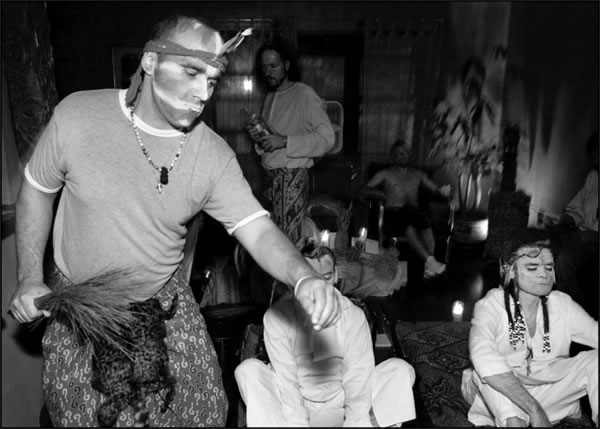By Scott Stiffler
IFC and Anthology documentaries shine a light
Man takes drug to stop taking drugs
Can a psychedelic plant release your demons? If you’ve got a monkey on your back, there’s only one way to find out. Too bad the drug that might help conquer your addiction is also a drug (and not legal). That’s just one of the ironies NYC native Michel Negroponte tackles in his documentary “I’m Dangerous With Love.” Here’s the plot, short and simple enough to understand no matter how high you may be:
Operating deep below the radar — and hovering just above the law — a reformed junkie travels the country on a sacred quest to administer a Schedule-1 controlled substance to addicts desperate to kick their habit. Even with the adrenaline buzz that comes from his missionary zeal, the stress of effectively executing that shadowy task is enough to drive a man to drink.
The man is Dimitri Mugianis, former front man for the band Leisure Class. The outlawed substance is the hallucinogen Ibogaine. In Africa, when administered by a shaman, taking Ibogaine is a socially accepted part of cultural rituals. But do that here in the states, and the next epiphany you experience will probably happen behind bars.
Ibogaine helped Mugianis get sober, so now he travels the country (and sometimes Canada) to help others use it as a gateway to sobriety. When a detox session turns into a very bad trip indeed, Mugianis begins to question how much of his mission has to do with public service, and how much of it is a self-indulgent shot at redemption.
That’s a great question, and a fantastic springboard for exploring a multitude of legal, cultural, spiritual and personal issues. It’s just too bad the film doesn’t display a junkie’s fix-chasing passion when it comes to finding answers (which, to be fair, are elusive to say the least). Instead, Mugianis goes on an ill-advised narrative detour to Gabon, West Africa — where our hero consults with Bwiti shamans and puts himself through a punishing Iboga initiation.
It’s fascinating stuff, to be sure. But like a pothead who’s gone down the rabbit hole after using one of those gas mask bongs they sell in Union Square, the filmmaker and his subject get distracted by indulgences just when they’re on the cusp of having a spectacular epiphany.
Pair of Liang docs
From the opening scene of “Crime and Punishment” (which eavesdrops on police meticulously folding their beddings), the message is clear: Don’t mess with those who thrive on precision.
Zhao Liang’s documentary follows Chinese military police officers as they take on the (mostly) petty crimes of those who live in an impoverished mountain town near the North Korean border. Whether you (or they) think wagering on mahjong or collecting scrap with an expired permit is a crime really doesn’t matter. Once you run afoul of authority, your goose is cooked. Lack of evidence might get you released eventually — but before that happens, you’re likely to get slapped around a little (at the very least, since the cameras stop rolling shortly after the first signs of abuse).
But as much as Liang seems intent on revealing the questionable wisdom of certain laws or exposing the ineptitude of those charged with enforcing it, the most powerful moment of “Crime and Punishment” comes when the son of that poor scrap collector mouths off to the arresting officers over the phone. As their demands for a formal apology become more aggressive, it’s clear that disrespect is the greatest, most dangerous offense of all.
Also screening at Anthology is “Petition” — Liang’s decade-long exploration of ‘petitioners’ who come from all over China to make complaints in Beijing about abuses committed by their local authorities.






























